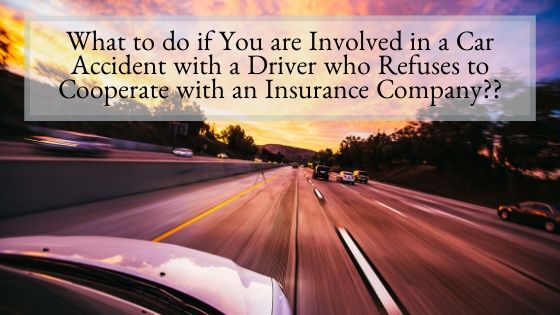After an automobile accident, assuming no one was seriously injured, things can be a bit chaotic, what with all the exchanging of documents, inspection of vehicle damage, communication with law enforcement officials and everything else that comes along with the post-traumatic elements of such an incident. The last thing you need in a situation like this is to deal with a driver who refuses to cooperate with an insurance company. If you are experiencing this issue, it is important that you retain the services of an experienced car accident attorney who understands the legal ways to hold this individual accountable.
To say it can be frustrating when another driver won’t contact or cooperate with the adjuster when you’re trying to make a claim is an understatement; indeed, if you have been involved in an accident deemed the other driver’s fault but that individual isn’t returning an adjuster’s calls, it leaves you in a precarious pickle. Before we get into the specifics regarding what to do in this situation, let’s cover a couple of car accident attorney basics you should be up to speed on.
The “Duty to Cooperate” Clause
Every insurance policy contains what is known as a “Duty to Cooperate” clause which states that any person looking for coverage under the policy must cooperate with the company’s investigation and claim defense. Here’s what is most important here: Failure to cooperate may lay the groundwork for the insurance firm to deny coverage.
A question our car accident attorney staff at the Law Offices of David Kohm hear all the time is, “Why would I not be covered if I’m seeking coverage under the policy…and I’m cooperating?” The short answer to this is that, technically, you are not actually seeking coverage under the policy – your claim is one of legal liability against another person when you claim that someone else is at fault. Your claim, since the policy is crafted to protect the individual who may be liable to you, represents something of an antagonistic approach with regard to the other driver and their insurance provider.
You could also have different types of insurance coverage so that you are protected in these types of scenarios.
- Collision Coverage – With this type of coverage, your insurance company will pay to have your vehicle fixed irrespective of the other individual’s insurance coverage; however, this only covers your motor vehicle, not any personal injuries.
- Uninsured Motorist Coverage – Here, you may be in a position to make a claim even though the other party technically carries insurance.
Let’s attempt to break this down more succinctly for you.
Understanding the Differences Between Various Legal Elements
- Your Standing with the Insurance Company – Under another driver’s policy, you are not the insured or covered party; the “insured” is the individual actually covered under the policy, and may encompass the person specifically named in the policy or who may otherwise fall under the definition of a “covered party.” It is important to understand that this aforementioned definition does not include you – to the contrary, you are the outside entity making a claim on someone else’s policy. Indeed, you are alleging that the other driver is legally liable to you for injuries or damages you personally sustained in the accident (this is referred to as a “liability claim” or “third-party claim”).
- The Liability/Third-Party Claim – One of the largest myths floating around out there regarding the way liability insurance works is how most people think the other driver’s insurance policy is there to protect them if the other driver is at fault. In reality, when a claim is made on the other driver’s insurance policy, you are essentially asserting a legal claim against the other driver. As such, it’s the other driver’s insurance firm’s duty to protect their driver against your claim, and this is done in several ways which are outside the scope of this blog.
Now, let’s get back to the crux of this article, which is what to do if a driver isn’t cooperating and leaves you in the lurch. If you find yourself in this predicament, we recommend that you contact an experienced car accident attorney who deals with these types of situations on a regular basis.
- Filing a Lawsuit – When filing a claim on your insurance isn’t an option, filing a lawsuit is the corrective turn you can make; however, be aware that you cannot sue the insurance company directly – you have to take the other driver to court.
Call our law offices today at any of our convenient locations and get a free consultation.
Arlington (817) 522-4451
Dallas (972) 362-6848
Fort Worth (817) 764-1375
Plano (972) 354-4602
Cedar Hill (972) 338-9427
McKinney (469) 522-3688
Lewisville (972) 354-4605
Frisco (972) 725-7681
Grapevine (817) 835-8677
Irving (972) 354-4610
Keller (817) 204-0904
Garland (214) 572-2251
Denton (940) 222-4060
Addison (972) 564-8108
You can also contact us online by using our quick contact form.











